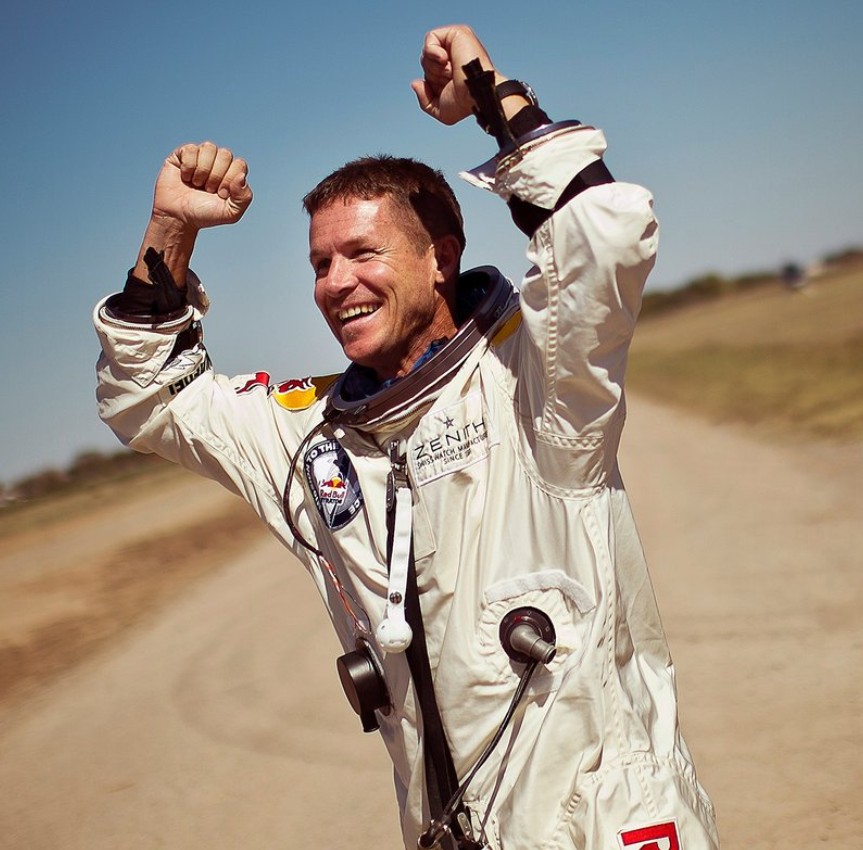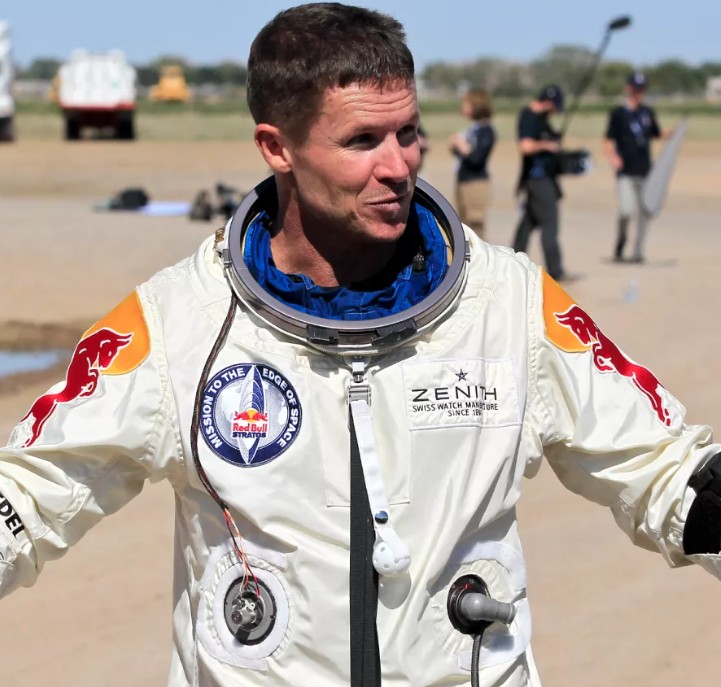Felix Baumgartner Death Video and Austrian Skydiving Pioneer
On a quiet afternoon in Porto Sant’Elpidio, a seaside town in Italy’s Marche region, the tranquility was shattered when a motorized paraglider spiraled out of control and crashed into a hotel swimming pool. The pilot was none other than Felix Baumgartner, the Austrian daredevil known worldwide for his supersonic space jump in 2012. At 56, the extreme sports icon met a sudden and tragic end while doing what he had loved his entire life: flying.

This article reflects on the remarkable life, accomplishments, controversies, and final moments of “Fearless Felix,” who pushed the boundaries of what was humanly possible, only to perish in a moment of unexpected fragility.
Contents
The Tragic Incident in Italy and Video
Felix Baumgartner’s final flight took place on a sunny Thursday afternoon. While flying over Porto Sant’Elpidio with his motorized paraglider, he reportedly lost control mid-air. According to witnesses, the aircraft suddenly began spinning before plummeting toward the ground. He landed in a swimming pool at the Clube del Sole Le Mimose beachside resort, an unexpected end for a man known for executing some of the most meticulously planned jumps in history.
The accident video that led to Felix Baumgartner’s eternal departure
felix-baumgartner-death-video.mp4
A 30-year-old eyewitness, Mirella Ivanov, described the scene in chilling detail: “Everything was normal, then it started to spin like a top. It went down and we heard a roar. I thought it crashed on the rocks.” She recounted the panic as lifeguards and onlookers ran to the scene while she shielded her young children from the unfolding tragedy.
The town’s mayor, Massimiliano Ciarpella, later stated that preliminary reports suggested Baumgartner may have experienced a sudden medical emergency mid-flight. While investigations into the cause are ongoing, the mayor extended condolences, calling Baumgartner “a symbol of courage and passion for extreme flights.”
Fortunately, no hotel guests were seriously harmed, although one employee sustained minor injuries. The pool was temporarily closed but later reopened once safety was confirmed.
A Legacy Written in the Skies
Felix Baumgartner’s name became immortalized in 2012 when he ascended to the stratosphere and jumped from a balloon floating 38 kilometers (24 miles) above Earth. Wearing a custom pressurized suit, he broke the sound barrier in freefall, reaching speeds of over 1,343 km/h (834 mph), and became the first person to achieve this feat without mechanical propulsion.

The jump took place over Roswell, New Mexico, on the 65th anniversary of Chuck Yeager’s historic flight that first broke the sound barrier. During his nine-minute descent, Baumgartner briefly entered a dangerous flat spin, losing control for 13 seconds, an incident that could have proven fatal had he not regained composure. But he survived and landed safely in the New Mexico desert, completing what many called one of the most daring human feats of all time.
“When I was standing there on top of the world, you become so humble,” Baumgartner later said. “You do not think about breaking records anymore, you do not think about gaining scientific data. The only thing you want is to come back alive.”
The Rise of “Fearless Felix”
Born in Austria, Felix Baumgartner always dreamed of flying. As a child, he climbed trees to gain a view from above. That dream eventually translated into a career as a military parachutist for the Austrian army. But Felix didn’t settle for traditional forms of skydiving. He became captivated by base jumping, performing jaw-dropping stunts from bridges, buildings, and iconic landmarks around the world.
Among his most famous jumps were:
Leaping from the Christ the Redeemer statue in Rio de Janeiro.
Skydiving across the English Channel.
Parachuting off the Petronas Towers in Kuala Lumpur.
His body was marked by a tattoo that summed up his essence: “Born to Fly.” He spent recent years performing helicopter stunts with the Flying Bulls team across Europe, combining his skydiving expertise with acrobatic aviation.
A Man of Controversy
While his accomplishments in the air earned global admiration, Baumgartner’s persona on the ground was more polarizing. He openly supported controversial political views and often waded into public debates that caused backlash.

In Austria, he became known for expressing admiration for authoritarian governance. In 2010, he was fined €1,500 for punching a Greek truck driver during a traffic altercation near Salzburg. His confrontational tone spilled over into social media, where he frequently criticized climate activists, Green parties, and LGBTQ+ communities.
In 2016, Baumgartner sparked international outrage by suggesting Hungary’s far-right prime minister Viktor Orbán should receive the Nobel Peace Prize for his strict anti-immigration stance. In one of his final social media posts before his death, he criticized Swiss footballer Alisha Lehmann’s advocacy for closing the gender pay gap, arguing that “women don’t have the same audience ratings” and therefore shouldn’t expect equal pay an opinion that was swiftly condemned by equality advocates.
These controversial opinions stood in sharp contrast to the awe his physical feats inspired, leaving a divided legacy of admiration and discomfort.
Reactions to His Death
News of Felix Baumgartner’s sudden death stunned the extreme sports world. Tributes poured in from fellow athletes, fans, and commentators who praised his bravery, innovation, and contributions to skydiving and aviation science.
Although his death occurred during what should have been a relatively safe recreational flight, it served as a reminder of the constant risks faced by those who choose to live life on the edge.
“He was more than an adrenaline junkie,” said one fellow skydiver. “He was a master planner, an engineer of possibility. He didn’t just take risks, he calculated them down to the second.”
Porto Sant’Elpidio’s mayor spoke for many when he said Baumgartner “represented the human will to fly, to transcend limitations, and to live without fear.”
Remembering the “God of the Skies”
Felix Baumgartner often insisted that he hated being called a “thrill-seeker.” For him, each jump was a combination of science, strategy, and psychology. He prided himself on being a disciplined, technical athlete, not a daredevil chasing headlines.
His space jump in 2012 wasn’t just a stunt. It provided valuable scientific data on the effects of supersonic freefall on the human body, aiding future aerospace innovations. His willingness to risk everything inspired countless people to pursue aviation, engineering, and even philosophy.
“I always had the desire to be in the air,” Baumgartner once said. “Sometimes we have to get really high to see how small we are.”
That quote has become a symbolic epitaph for a man who touched the edge of space and perhaps the edge of human potential.
Felix Baumgartner was not a perfect man. He was bold, brilliant, and often brash. He defied gravity and challenged human limits, all while wrestling with controversy and criticism. But in life and now in death, he reminded the world that courage is not the absence of fear, but the decision to move forward despite it.
As the sun sets over Porto Sant’Elpidio, one can imagine the silhouette of a man in flight, racing toward the horizon, chasing dreams that only the sky could contain.
Daily Hot News -Eastman Credit Union Johnson City TN Video and Public
Sharife Cooper and Ash Kash Viral Video and Online Frenzy
Conor McGregor and Azealia Banks Video Sparks Global
Kaeelen Garcia Viral Video and Raises Privacy Concerns
Karina García Viral Video and Private Footage Sparks
Sondra Blust Viral Video and Private Moment Turned Public
Sister Hong Video Scandal and Internet Worldwide
